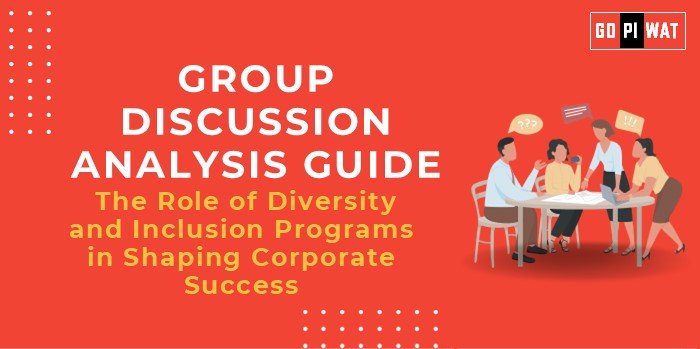📋 Group Discussion Analysis Guide: The Role of Diversity and Inclusion Programs in Shaping Corporate Success
🌐 Introduction to the Role of Diversity and Inclusion Programs
- Opening Context: In an increasingly globalized and dynamic business environment, diversity and inclusion (D&I) have emerged as critical factors driving organizational success. Companies worldwide are recognizing the competitive advantage offered by inclusive workplaces that embrace differences in gender, culture, ethnicity, age, and perspectives.
- Topic Background: The role of D&I gained momentum over the last two decades, spurred by societal movements, changing demographics, and data-backed research highlighting its impact on innovation, employee morale, and financial performance. Major corporations like Google, Accenture, and Microsoft have set benchmarks in implementing successful D&I programs.
📊 Quick Facts and Key Statistics
- 📈 Global Research Insight: Companies with higher gender diversity outperform peers by 25% in profitability (McKinsey, 2023).
- 😊 Employee Satisfaction: 85% of employees feel more engaged in inclusive workplaces (Glassdoor, 2023).
- 💡 D&I Investment: Over 70% of Fortune 500 companies have dedicated D&I strategies.
- 🚀 Innovation Edge: Diverse teams are 87% better at decision-making and problem-solving (Forbes, 2022).
- 👩💼 C-Suite Impact: Companies with diverse leadership are 36% more likely to outperform competitors (BCG, 2022).
🌟 Stakeholders and Their Roles
- 🏢 Corporate Management: Responsible for driving D&I policies, creating inclusive leadership pipelines, and ensuring accountability.
- 👩💼 Employees: Key participants in fostering an inclusive culture through collaboration and allyship.
- 🧑💻 HR Departments: Implement D&I hiring strategies, organize sensitivity training, and track inclusion metrics.
- 🏛️ Government and Policymakers: Enforce anti-discrimination laws and promote equal opportunity initiatives.
- 🛍️ Clients/Consumers: Increasingly favor brands that align with social values like diversity and equity.
🏆 Achievements and Challenges
Achievements
- ✔️ Improved Innovation: Diverse teams bring fresh perspectives that drive creative solutions. For instance, Google’s inclusive hiring has boosted product innovation in global markets.
- 📈 Financial Performance: A Harvard study found that inclusive workplaces achieve a 19% higher revenue due to improved collaboration and efficiency.
- 🏅 Workplace Equity: Accenture’s “Inclusion Starts with I” initiative increased gender diversity in leadership roles by 40%.
- 🌐 Global Talent Attraction: Companies like Microsoft attract top talent due to robust D&I programs.
Challenges
- ⚠️ Tokenism: Superficial D&I policies without real cultural change lead to mistrust.
- 👤 Implicit Bias: Unconscious biases in recruitment and promotions hinder true inclusion.
- 📊 Measurable Impact: Many companies struggle to quantify the long-term success of D&I initiatives.
Global Comparisons
- 🇺🇸 United States: Companies like Salesforce lead with “equal pay for equal work” initiatives.
- 🇪🇺 Europe: Sweden and Germany mandate gender quotas for corporate boards, ensuring representation.
Case Study
Microsoft’s D&I Strategy: Microsoft’s commitment to increasing accessibility and gender balance has resulted in 30% of leadership roles being held by women.
📚 Structured Arguments for Discussion
- 🟢 Supporting Stance: “D&I programs enhance innovation, employee engagement, and profitability, creating long-term corporate success.”
- 🔴 Opposing Stance: “D&I initiatives are often tokenistic and can become costly exercises without clear, measurable outcomes.”
- ⚖️ Balanced Perspective: “While D&I programs hold great potential, their effectiveness depends on actionable frameworks, leadership commitment, and cultural alignment.”
💡 Effective Discussion Approaches
- Opening Approaches:
- 📊 Start with a powerful statistic: “Companies with diverse leadership achieve 36% higher profitability.”
- 📖 Use a relevant case study: “Accenture’s 40% leadership gender diversity speaks volumes about the tangible benefits of D&I.”
- Counter-Argument Handling:
“While concerns about tokenism persist, true inclusion focuses on cultural change and measurable results, as seen in Microsoft’s accessibility programs.”
📊 Strategic Analysis of Strengths and Weaknesses
- 🌟 Strengths: Innovation boost, financial growth, stronger employer branding.
- ⚠️ Weaknesses: Risk of superficial policies, challenges in tracking success.
- 📈 Opportunities: Technology for bias-free hiring, global partnerships for inclusive growth.
- ⚡ Threats: Resistance to change, cultural inertia, economic constraints.
🎓 Connecting with B-School Applications
- 📋 Real-World Applications:
- Finance: Assessing ROI on D&I investments.
- HR Management: Case study analysis of successful D&I strategies.
- Organizational Development: Culture transformation projects.
- 📋 Sample Interview Questions:
- “How do D&I programs contribute to organizational success?”
- “What challenges might organizations face while implementing D&I strategies?”
- 💡 Insights for Students:
- Understand D&I as a driver of innovation and profit.
- Explore how D&I aligns with ESG (Environmental, Social, and Governance) goals.


